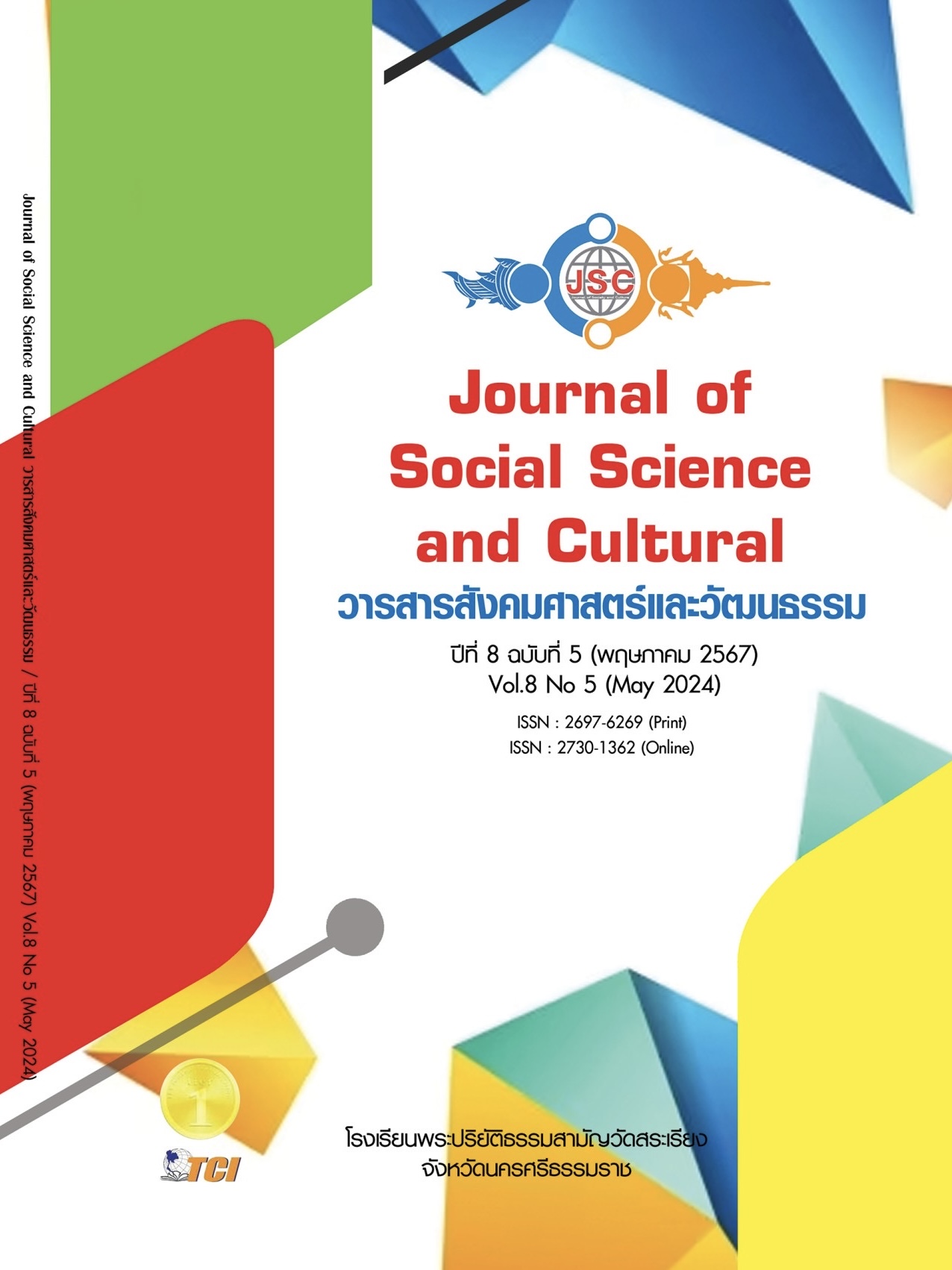BUSINESS LEARNING NETWORK DEVELOPMENT PROCESS FOR ADJUSTING THE PRODUCTION METHODS TO UPGRADE THE LOCAL ECONOMY AND THE QUALITY OF LIFE AMONG THE COCONUT FARMERS IN PAKPOON TOWN MUNICIPALITY, NAKHON SI THAMMARAT
Main Article Content
Abstract
The objective of this research was to study the business learning network development process for adjusting the production methods to upgrade the local economy and the quality of life among the coconut farmers in Pakpoon Town Municipality, Nakhon Si Thammarat Province. It is a study of mixed methods research. Quantitative data was collected using a questionnaire tool by selecting a sample group according to the proportion of the characteristics of interest in the population equal to 0.5, a total of 169 people. Qualitative data was collected using a building uniform business networking of interview form 25 coconut farmers. It was found that the production potential of coconut farmers in the Pakpoon Town Municipality area has unique products that reflect local wisdom at the highest level ( = 4.07, SD = 0.67). While the processes of production and the development of continuous productivity of marketing network members were at a high level (
= 4.03, SD = 0.76). In addition, the study found that the potential for efficiency in knowledge management of coconut farmers in the Pakpoon Town Municipality area have passed on knowledge about coconut cultivation to their children or relatives or the general public who are interested at the highest level (
= 4.07, SD = 0.67). The collection of data about coconut farming, such as methods of planting and harvesting, maintaining productivity and product sales, were at the highest level (
= 4. 05, SD = 0. 70). Field surveys of coconut plantation community data were conducted using the method “Walk and visit the garden, invite each other to talk, go through the work, develop sugar, manage produce” to create a learning network that is conducive to the education management system. The next study suggestion to develop a network to develop a learning city for coconut plantation entrepreneurs to have comprehensive knowledge.
Article Details
References
จํานงค์ อดิวัฒนสิทธิ์. (2558). การวิจัยชุมชน โดยชุมชนและเพื่อชุมชน ในยุครวมกลุ่มเป็นชุมชนเครือข่ายเศรษฐกิจและสังคมอาเซียน. ใน วิทยานิพนธ์พุทธศาสตรมหาบัณฑิต สาขาวิชารัฐประศาสนศาสตร์. มหาวิทยาลัยมหาจุฬาลงกรณราชวิทยาลัย .
จิตติมา ดำรงวัฒนะ. (2562). เครือข่ายซอแรง: การพัฒนาขีดความสามารถด้านการจัดการกลุ่มอาชีพ กรณีศึกษา วิสาหกิจกลุ่มกล้วยกรุงชิง ตำบลกรุงชิง อำเภอนบพิตำ จังหวัดนครศรีธรรมราช. ใน การประชุมระดับชาติ การบริหารการพัฒนาสังคมและยุทธศาสตร์การบริหาร ประจำปี 2562 (231-242) จังหวัดศรีสะเกษ. มหาวิทยาลัยราชภัฏศรีสะเกษ .
ชิตชยางค์ ยมาภัย และพูธ คูศรีพิทักษ์. (2562). ‘ผู้กบฏ’ ปะทะ ‘นักปฏิรูป’: ยุทธการสืบสานวัฒนธรรมในสังคมกลุ่มชาติพันธุ์ไทดำ. วารสารมหาวิทยาลัยศิลปากร, 39(3), 48-62.
นฤพันธ์ สมเจริญ. (2565). นวัตกรรมการเสริมสร้างการมีส่วนร่วมของเครือข่ายทางสังคมตามหลักอารยธรรมวิถีสี่ครูบาในจังหวัดลำพูน. ใน ดุษฎีนิพนธ์พุทธศาสตรดุษฎีบัณฑิต สาขาวิชาการพัฒนาสังคม. มหาวิทยาลัยมหาจุฬาลงกรณราชวิทยาลัย.
ปรารถนา มินเสน. (2560). ความรู้ความเข้าใจในการสร้างแผนกลยุทธ์การเพิ่มขีดความสามารถของชุมชน จังหวัดเชียงใหม่ภายใต้กรอบประชาคมอาเซียน. วิทยาการวิจัยและวิทยาการปัญญา, 15(1), 93-101.
พระครูใบฎีกาศักดิ์ดา กิตฺติสมฺปนฺโน (เหลาลาภะ). (2564). การพัฒนารูปแบบการสร้างเครือข่ายชุมชนคุณธรรมต้นแบบเชิงพุทธ ในอำเภอบ้านฝาง จังหวัดขอนแก่น. วารสารนิติศาสตร์และสังคมท้องถิ่น, 5(2), 129-139.
พระสมชาย จนฺทสาโร. (2562). บทบาทของผู้นำชุมชนกับการพัฒนาคุณภาพชีวิตในชุมชนสุขฤดีแขวงท่าแร้ง เขตบางเขน กรุงเทพมหานคร. ใน วิทยานิพนธ์พุทธศาสตรมหาบัณฑิต สาขาวิชาการพัฒนาสังคม. มหาวิทยาลัยมหาจุฬาลงกรณราชวิทยาลัย.
เพ็ญนภา สวนทอง. (2562). นิเวศวิทยาการเมืองของการจัดการทรัพยากรชายฝั่งอ่าวบ้านดอน จังหวัดสุราษฎร์ธานี. ดุษฎีนิพนธ์รัฐศาสตร์ดุษฎีบัณฑิต สาขาวิชาเศรษฐศาสตร์การเมืองและการบริหารจัดการ, มหาวิทยาลัยบูรพา.
เริงวิชญ์ นิลโคตร และคณะ. (2564). แนวทางการพัฒนาทุนทางสังคมเพื่อการเรียนรู้ตลอดชีวิตของชาวผู้ไทยบ้านคำกั้ง อำเภอกุฉินนารายณ์ จังหวัดกาฬสินธุ์. วารสารสังคมศาสตร์และวัฒนธรรม, 5(2), 1-18.
Krejcie, R.V., & Morgan, D.W. (1970). Determination sample size for research activities. Education and Psychology Measurement, 30(3), 607-610.


